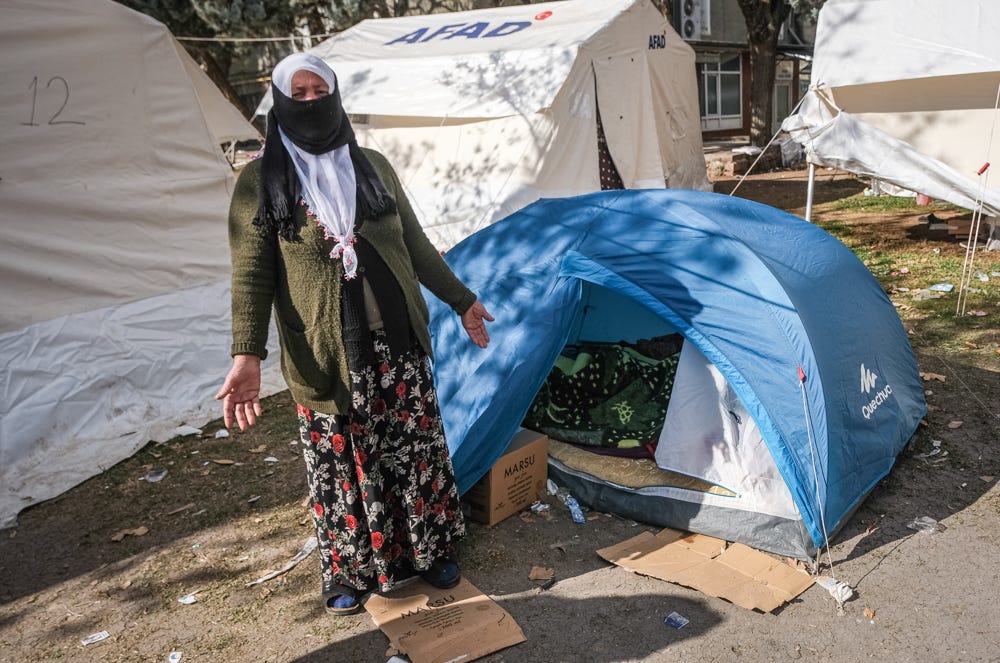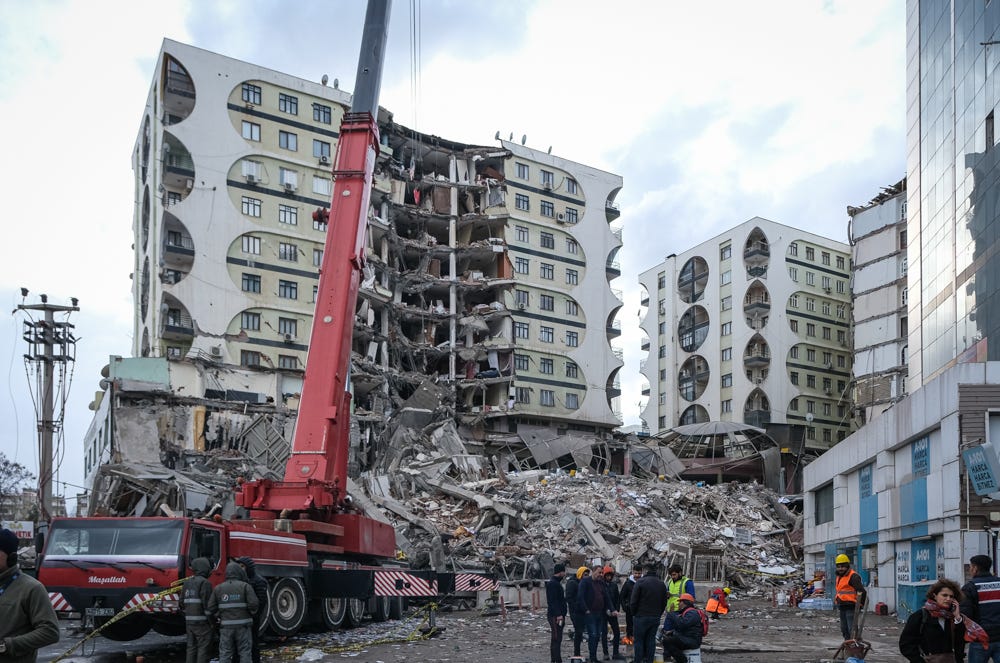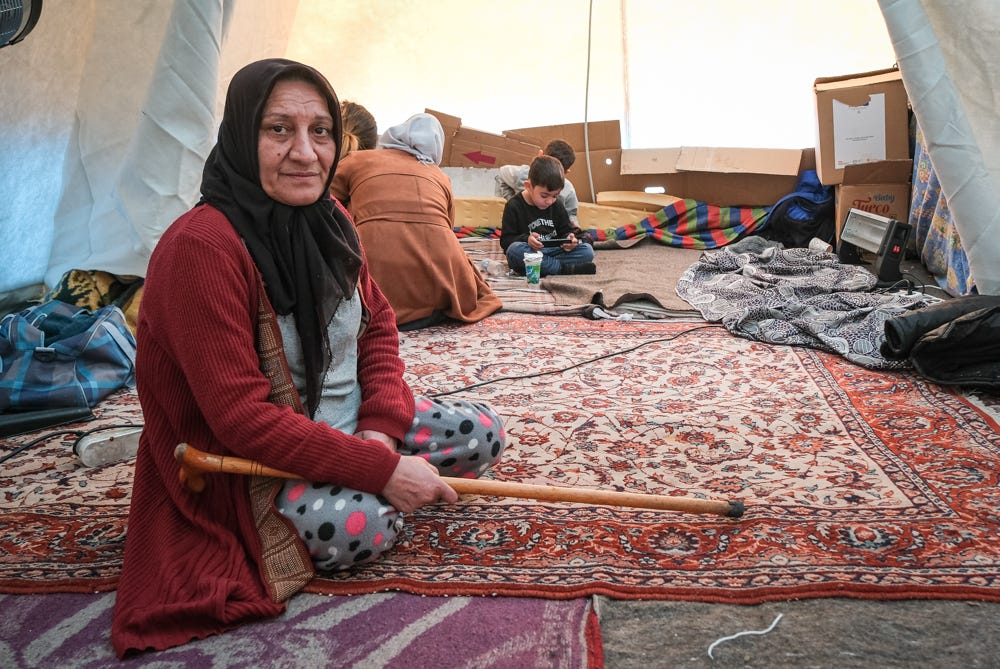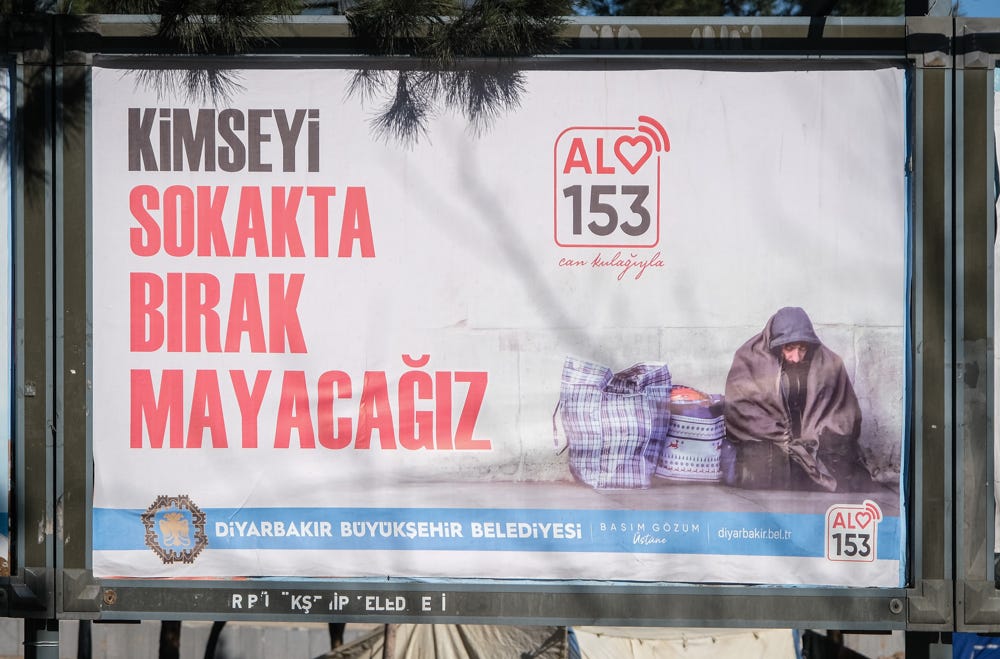
Before the Feb. 6 twin earthquakes, the Diyarbakır Metropolitan Municipality placed posters around the city that read: “We will not leave anyone on the street.” Today, many of those ads face tent encampments where thousands of people have taken shelter following the tremors.
Faced with countless post-quake challenges, displaced Diyarbakır residents interviewed by Turkey recap said rising rents, opportunistic landlords and a general lack of aid presented additional obstacles to their search for new homes.
Throughout Turkey, rent prices have skyrocketed in recent years, and Diyarbakır residents complain many local landlords are raising their rates and won’t make exceptions for people whose homes collapsed or were rendered uninhabitable by the earthquakes.
As a result, some of the city’s residents are staying with relatives in nearby villages, while those without alternatives have remained in tents for more than two weeks.
Songül Kalkanlı, a displaced mother of three children, said her building’s support columns suffered structural damage so she is currently staying at the Diyarbakır sports stadium.
“We don't have a place to stay,” Kalkanlı told Turkey recap, adding the food and accommodation needs of the earthquake victims were being met in the stadium. “They take care of us, but we don't know how long it will continue. We are devastated.”
Kalkanlı said following the earthquakes, Diyarbakır rents rose to levels her husband’s minimum wage salary (about 8,500 TL) could not afford. She said the rates charged by moving companies also rose significantly.
“Landlords are trying to kick out old tenants and charge new ones 5,000-6,000 liras,” Kalkanlı said. “I am outraged, but what can I say and to who do I say it? … The state should give us a hand and help.”
"Real estate opportunism"
Diyarbakır Real Estate Agents and Consultants Association Pres. Mustafa Koç confirmed there was "real estate opportunism" in the city after the earthquake. He said Diyarbakır rents had nearly tripled since Feb. 6, further punishing earthquake victims.
Koç added association members found to be abusing the situation would be expelled.
“Our members should not act as intermediaries in the leasing and selling business of landlords who demand high rents,” Koç told Turkey recap. “I request our citizens file a complaint with the relevant authorities regarding rent costs. We will certainly do our best to punish those who demand unrealistic rents, regardless of who they are.”
Sacide Söylemez, another displaced resident, said she felt helpless after clean-up crews declared her home unsafe for habitation and moved her belongings to an unknown location. She added her husband also earned a minimum wage.
“You know how much the minimum wage is,” Söylemez said. “How will I pay rent with it, eat with it, how?”
Süphan Turhan, who moved out of his house due to cracks in the building, describes what happened as a "tragedy." He said his family stayed in a mosque for days and now they moved to the village.
“We looked at many houses and the rents were very expensive,” Turhan told Turkey recap.
“Just look, homes are 9,000-10,000 liras,” he continued. “In one place, the man first said 3,500 liras, then raised it to 7,000 liras. Where can we go with this situation? This is dishonest. There was an earthquake, many people died … No human does that. While foreigners are helping, our own people are oppressing us.”
Damage assessment
During the earthquake, a total of 22 buildings collapsed in Diyarbakır, seven of which were in the city center. Damage assessment studies carried out by the Provincial Directorate of Environment show the structural toll might be much broader. According to their observations to date, 1,044 buildings in the city were moderately damaged, and another 1,110 buildings were severely damaged, rendering the latter candidates for immediate demolition.
According to data released Feb. 18 by the Diyarbakır City Protection and Solidarity Platform, 409 city residents lost their lives and 902 people were injured due to the earthquake.
While mainly schools, mosques, train cars, city stadiums, sports halls and other facilities were used to shelter displaced residents, the state institutions of AFAD and Kızılay also set up tents at various points in the city.
According to AFAD data, 6,328 people currently live in tents in Diyarbakır. The total number of people who took shelter at various points throughout the city due to the earthquake was about 22,000.
Crowded tents
Preparations continue for AFAD to establish a 675-container shelter next to the Gazi Yaşargil Training and Research Hospital. In the meantime, Serkan Yaprak and his family live in a tent they share with 17 people from three other families.
“So much help has come to Diyarbakır. What happened to it? We don’t understand,” Yaprak told Turkey recap.
“They brought us an old blanket. We did not accept it. We went and brought one from our home,” he continued. “No shoes, no clothes, nothing. My coat turned black because of the smoke from the fire we light to ward off the cold in the evening. No one asks about my condition. Our house is damaged. They said tell us to stay out of it. I don't know what to do.”
Zeynep Yücel, a displaced resident with diabetes and high blood pressure, has wounds on many parts of her body and walks with a limp. Yücel said 18 people live in her tent because their houses were damaged.
She also complains about the lack of aid, noting the electricity cuts off from time to time in the evenings in Sümer Park, where her tent is located. Yücel says her family sits by a fire until the morning to stay warm.
“It's cold, I don't go to bed until morning,” Yücel told Turkey recap.
“They don't give wood either. We collect cardboard or something and burn it. No one asks us if we are hungry … There are two or three old blankets in our tent, which my relative brought from outside [the camp]. They tell us they are helping us. They don't help, they really don't help."
According to Yücel, the aid is not only inadequate, but it’s also distributed in a disorganized manner.
“Some families get four to five cardboard pieces, others get none at all,” Yücel said, referring to cardboard used to as flooring in tents. “Some take blankets, leave them at their homes in the evening, and then ask for help again in an empty tent. We are also citizens of Turkey. They should treat everyone equally.”
Hard times for refugees
Although living conditions are harsh for almost all earthquake survivors in various parts of the city, the situation is much worse for refugees. Some Syrians in Diyarbakır could not secure tents.
As a result, they live in mostly makeshift tents set up in Koşuyolu Park, where one of the visible tents is made of blankets sown together. The Kurdish family from Syria that stays in that tent is hesitant to speak.
“If I talk, they will send me to Syria,” one family member said. “We can no longer live there. There is so much to say, but I am afraid to speak.”
Another group of Syrians, the Kellali family, is currently using the tent they received in Şanlıurfa after their arrival to the Turkey 11 years ago. They had lived in the tent for their first five years in the country and rebuilt it once again after the earthquake.
“We came here after the earthquake. There were no tents, so we set up our tent,” Abdulmelik Kellali said. “There were cracks in our house, too. The authorities came, looked and said 'you can't stay here.' We are here now [in the tent] until we find a safe place.”

Helping hands
Although there are many obstacles to meeting the needs of Diyarbakır’s displaced residents, there are also those providing assistance in attempt to fill in the gaps. One of them is Hasan Cantürk, who came to Diyarbakir from İzmir with aid trucks.
Stating he viewed AFAD aid as insufficient, Cantürk said that he started to help through his own efforts.
"We will overcome these days hand in hand," Cantürk told Turkey recap. “Instead of waiting for something from somewhere, we tried to do what we could. We want anyone to do what they can these days. If help is needed, help. If housing is needed, open your homes.”
Turkey recap is an independent platform supported by readers via Patreon and Substack. Members get access to our Slack, news tracking tools, calendar and more.
We also invite you to visit our merch store, but if you simply liked what you read, subscribe here or forward it to a friend. Feedback and pitches: info@turkeyrecap.com.
Diego Cupolo, co-founder + editor @diegocupolo
Gonca Tokyol, freelance journalist @goncatokyol
Ingrid Woudwijk, freelance journalist @deingrid
Verda Uyar, freelance journalist @verdauyar
Gökalp Badak, editorial intern @gklpbdk





